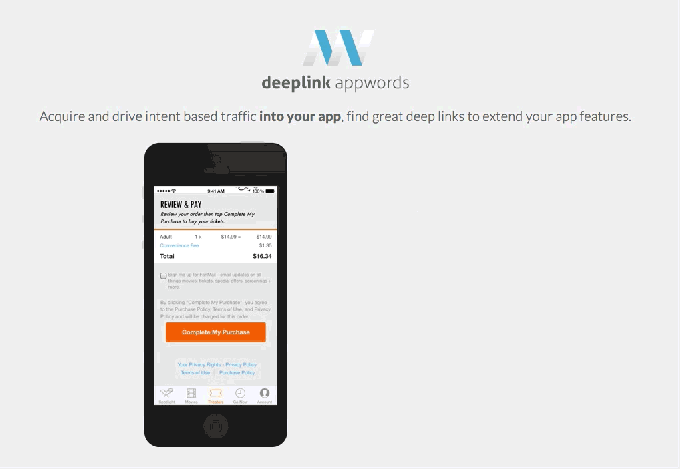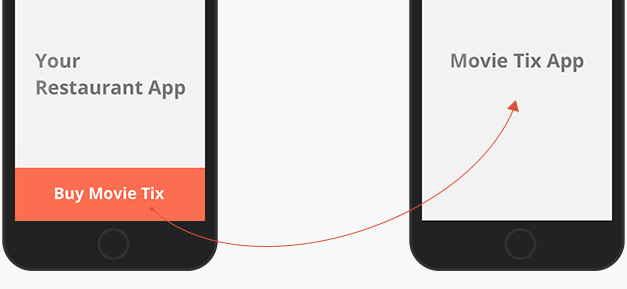Here comes one more use case for deep linking — the technology that lets mobile apps reach outside of their respective walled gardens so that users can search and navigate between specific places within them. Israel’s Deeplink.me, one of the startups developing services based on the technology, is today launching AppWords, a mobile search and ad platform that uses keywords to trigger relevant content between one app and another.
If you think the name “AppWords” sounds a lot like Google’s “AdWords”, it’s not a coincidence. Deeplink CEO and co-founder Itamar Weisbrod is deliberate in trying to associate what his startup is doing with what Google did when it launched its keyword-based textual ads that come up based on what you put in a Google search, with businesses purchasing those ads by way of a bidding system.
“It’s probably the service they should have built,” he said.
Deeplink will be making AppWords available for integration by way of an SDK. Using it, app developers will be able to add deep linking capability to their apps, which will link out to other apps at appropriate places.
As one example of how it will work: think of an app like Fandango for searching and buying cinema tickets. After you buy those tickets, there is an “exit point” where a user might be interested to search for and book seats at a place to eat before the movie starts. A link could take the customer to another restaurant search and booking app. Like this:

On the other side of the equation, marketers will be able to bid on those outbound links by way of related keywords, with the “auction winner” becoming the app that gets the linkthrough, with that link either being to a specific search based on availability near the cinema at a specific time, or whatever parameters the marketer specifies.
Deeplink.me — which was first launched almost two years ago when Weisbrod and co-founder Avi Elias were working on content discovery technologies — has been an early mover both in deep linking technologies, and also in getting customers on board using them in their apps.
Today, they have “thousands and thousands” of apps embedding Deeplink’s technology to offer dynamic links on the web that either link to a specific place in a businesses’ app if you have the app installed, or to a page to install the app, or to another web page, if you are not on a smartphone or tablet. Active customers include Shazam, WeWork, Fox, the New York Times and a bunch of large e-commerce businesses.
AppWords is basically the next step in that process, providing links not just within your own apps but to those that make the wider experience more interesting and useful, which could help an app retain its audience. Retention, of course, is a crucial metric these days, given the meteoric rise and fall many apps see these days.
The fact that Deeplink has been around for a while, and has already built up what it describes as a “massive” network of deep links for existing apps — some of which have already been using AppWords in beta — gives it a decent bedrock of inventory that the company believes will help it fly.
But it’s not without competition — or support, depending on how you look at it. Other early moves include Google Ventures-backed URX and the very heavily funded Quixey (Deeplink.me is practically bootstrapped by comparison). And Button, which picked up $12 million from Redpoint in January, is also building an ad network of sorts based on deep linking apps together.
(“Button is newer, and they focus on commerce plus the affiliate business model. Our model is more like search and adwords,” Weisbrod says of Button. “We’re actually pretty complementary to each other.”)
And Bit.ly — which ironically Sarah compared to Deeplink when Deeplink.me first started because of the short URLs that offered dynamic redirection — just made its own move into deep links last week. There are even consortiums of businesses collaborating on the technology.
And these startups are not the only ones. Google, Yahoo, Facebook, Twitter and Apple have all been making inroads into deep linking technology for developers using their platforms.
Nor is it the first time that Deeplink.me has tried to leverage its deep linking technology for an ad product. It first started to offer a retargeting service not long after it launched, but it lacked the scale to work well (hence the delay until now, when the network is much larger, to launch AppWords).
“It was only live for a few months,” Weisbrod told me. “We shut it down because we wanted to control the end to end experience, and not be dependent on buying ad space on the open exchanges.” He also says that it worked more like traditional retargeting. “AppWords is totally different. We own the experience end to end, and the targeting itself is more like search engine marketing traffic, where people bid on actual keywords (which is very different than retargeting).”
Again, you could look at all of the above as a competitive threat to Deeplink.me, or you can see it as a sign of where the app development and mobile search market is going, and where Deeplink hopes to be a central player going forward. For the sake of competition and innovation, let’s assume it’s the latter.
AppWords will be kicking off its service by luring in developers with a link exchange model: for every two clicks that the app drives to out other apps, they will receive one intent-based click back in to their app, the company says.
